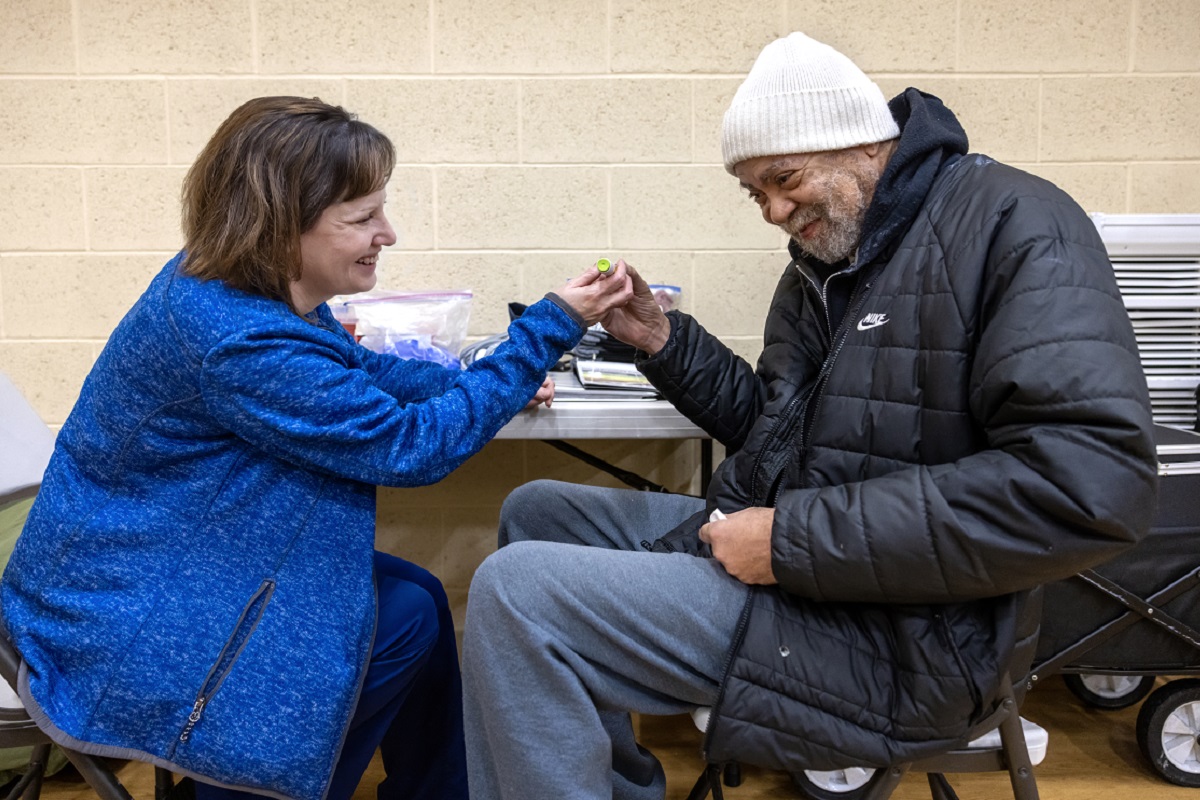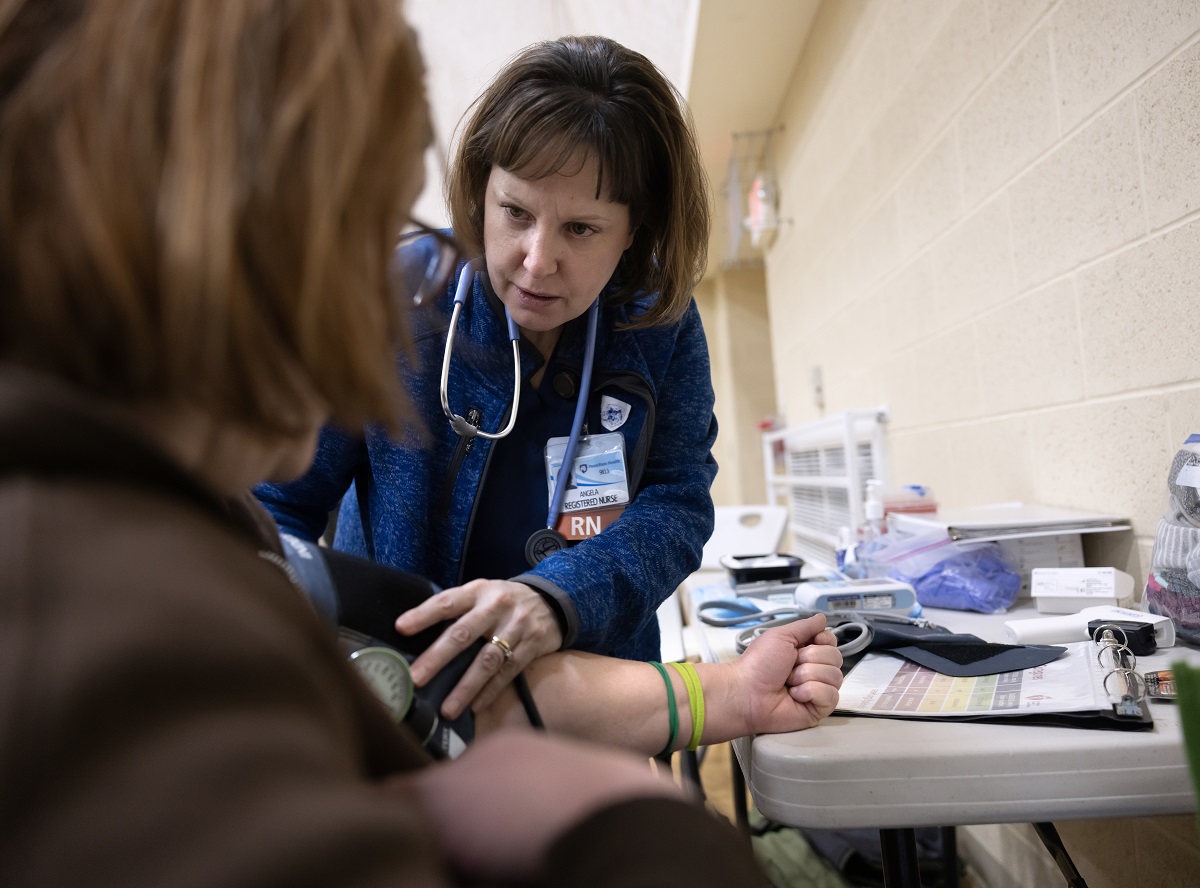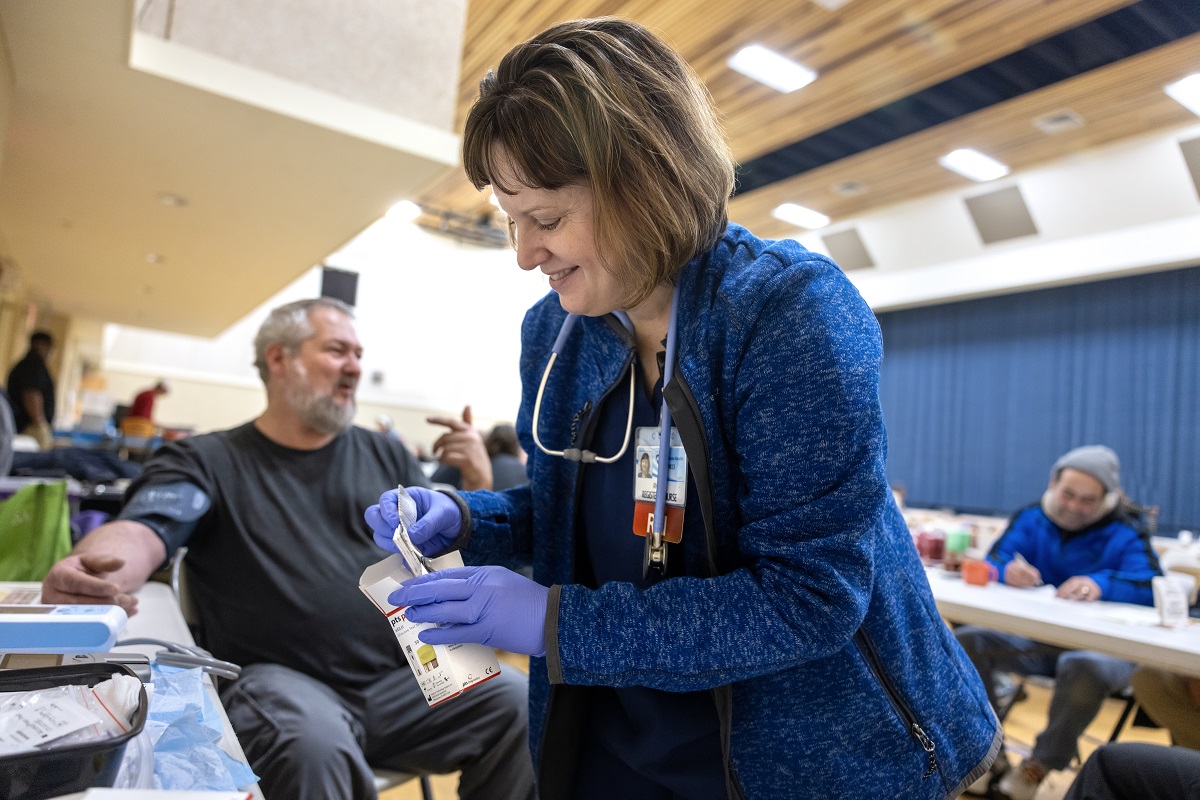 Angela Shuman, left, a community health nurse at Penn State Health, helps Keith Spells with his diabetes medication at Anchor Lancaster.
Angela Shuman, left, a community health nurse at Penn State Health, helps Keith Spells with his diabetes medication at Anchor Lancaster.
Keith Spells calls Angela Shuman his angel.
February 19, 2024
It functions as a catch-all description. As a Penn State Health community nurse, she’s many different people wrapped into one. During the Thursday breakfasts at Anchor Lancaster, a nonprofit that provides meals, shelter and casework for local low income and unsheltered populations, she’s a checker of blood pressure and a giver of medicine. She’s a confidante, a shoulder to cry on and an answer for people from whom the questions are often hard. Where can I turn when I’m sick? How can I survive another winter without shelter?
For the health system where she’s worked for 22 years, Shuman is a conduit to health care for people who need it desperately, but can’t always access it.
And on a raw day in late January, Shuman works as a stand-in for Spells’ eyes.
Spells, a gaunt man with a gray beard, arrives at the Anchor Lancaster office at the First United Methodist Church on Walnut Street in downtown Lancaster for a hot breakfast and a chance to shake off the cold. In the dining room, he stops to see Shuman, who is stationed at a narrow folding table piled with medical devices, rubber gloves and bags filled with socks.
Spells doesn’t see well enough to administer his own weekly medication for diabetes. So, he sits and lifts his coat for Shuman to give him an injection into his belly.
Next, she helps plan the week’s pills, using a plastic box divided into chambers labeled for each day. Hopefully, Spells will be all set for another week. If not, it’ll be OK. She’ll visit him at his apartment complex. Meeting your patients outside of the office is just what you do when you’re a community health nurse. After all, you don’t really have an office.
Welcome to the front lines of Penn State Health’s community outreach. Along with Anchor, which offers a hot breakfast, a day shelter, showers and case work, Penn State Health’s community health nurses help address local health disparities one person at a time. Above and beyond is the job.
In Lancaster County, conditions can change on a dime. Life expectancy varies drastically from block to block – veering from 67.7 to 88.2 years. Addressing wellness and access to care in central Pennsylvania are centerpieces of Penn State Health’s community health initiatives. In a 2021 survey of six counties in central Pennsylvania, one in seven respondents over the age of 50 had never received a colonoscopy. One in 15 women over the age of 40 had never received a mammogram – and the breast cancer rate in Lancaster County was the highest of the counties surveyed. Forty-two percent of respondents reported having high blood pressure, and 39% had high cholesterol.
Dozens of people faced with similar problems and in need of health care have connected with Shuman through her station at Anchor, which functions like a doctor’s office with no walls.
But it’s more than that. Men and women – many of whom are less fortunate than Spells, who has an apartment – turn to her for help just with surviving another day.
And for them, calling Shuman an angel isn’t far off the mark.
Not just health care
On the Thursday morning when Shuman gives Spells his shot, Anchor serves about 170 people French toast and ham for breakfast. Others take a shower or warm themselves and talk with friends. Many are unsheltered, but not all. Anchor helps anyone who needs it.

Angela Shuman, takes the blood pressure of Rhonda Brown while she visits her table during breakfast at Anchor Lancaster.
Shuman is one of a variety of representatives of local health care, law enforcement and other programs who position themselves at the edges of the breakfast. They are people who know how to help when you have nowhere else to turn. A man named Lenny can get you a sleeping bag if you need it. Doctors from other health care institutions are positioned nearby. Everyone works together.
Sometimes, guests’ needs are obscure. A woman Shuman works with is asking for help in obtaining a copy of her high school diploma. Shuman makes calls and visits websites to make it happen.
In her garage at home, Shuman has filled three garbage bags with socks gathered from nursing informatics departments across all five of Penn State Health’s acute care hospitals. Sometimes, people just swing by her table for a clean, dry pair or one of the stack of handwarmers she offers.
“Sometimes I’m just listening to people,” she said.
‘Always there for you’
When helping is about health care, the needs are sometimes dire. Concerns are all over the map – diabetes, heart disease, mental health issues and musculoskeletal problems are common.
DaVinci Vega was born and raised in Lancaster. He’s been visiting Anchor for years and used to help with putting tables and chairs away.
Now, Vega has deep scars on both legs, souvenirs from surgery he received to treat compartment syndrome, a painful pressure in his muscles caused by internal bleeding. During a medical appointment about his legs, a doctor discovered what might be cancer in his spine. The jury is still out.
Shuman is helping him navigate his insurance to find a doctor that’s right for him.
“She always helps me out with anything that I need,” he said. “She’s a beautiful person. She understands everybody. She’s always there for you.”
“Angie is connected so well with our guests,” said Patty Eastep, Anchor Lancaster’s executive director. “People are asking for her. They seek her out. We all love her.”
Shuman worked for years as a triage nurse at Penn State Heart and Vascular Institute ― IO Silver Clinic. One day, she volunteered at a community health event and liked it so much she applied for a job opening.
“I realized I had the solid nursing skills and the strong assessment skills to be out and independent in the community,” she said.
His angel
Shuman knows she’s making a difference, though it’s not always easy to see.
After she leaves Anchor Lancaster later that morning, she’ll go to a local Salvation Army, where she’ll perform cholesterol and blood pressure screenings. Here, she encourages lifestyle modifications among guests, like more exercise and better diets. Sometimes people’s numbers improve. But it’s not always easy to track. Patients sometimes move away or just go dark, and she can only hope that the work she’s doing has resonated and that wherever they’ve wound up, they’re OK.
But with patients like Spells, she knows it’s working. When Shuman first met him a couple years ago, he was unsheltered, nearly blind and attempting to give himself insulin injections twice a day.
Shuman recommended he speak with his doctor about a diabetes medication that only required a once-a-week injection, which he’s now on. “I could see him once a week for medication and diet teaching,” she said. “I couldn’t do twice a day.”
Sometimes he comes to see her at Anchor, but he doesn’t drive. Like many people in the area, a lack of transportation becomes a barrier to getting the care he needs. So often Shuman meets him and gives him the injection in the common room at his apartment.
She goes with him to his doctor appointments, where she’s learned his problems related to diabetes are improving.
After Spells receives his weekly dose, he gets up from Shuman’s table. He’ll spend an hour or so warming up, and then he’ll head back outside for a cold bus ride to his apartment.
Before he leaves, he nods in Shuman’s direction.
“Take care of my angel, now,” he says.
Helping families overcome disparities in health care is part of the Penn State Health strategy to address issues surrounding health equity. Learn more in the Penn State Health Community Health Needs Assessment and Implementation Plan.

Angela Shuman helps Scott Willow, rear left, during his visit to her table.
